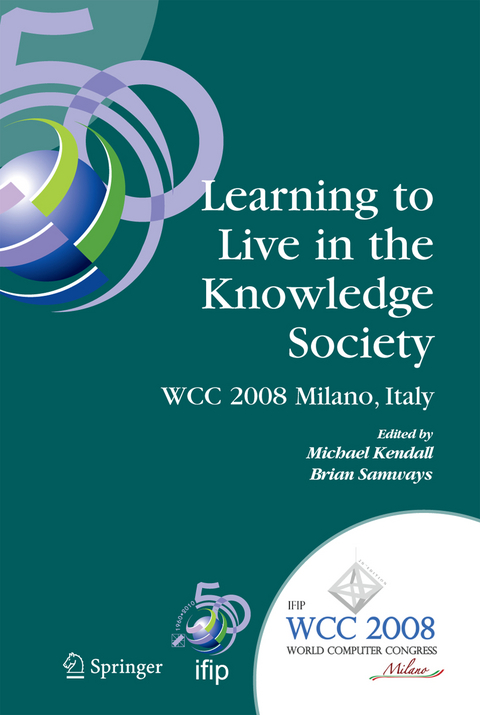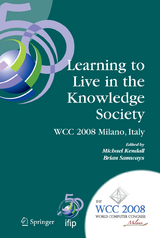Learning to Live in the Knowledge Society
Springer-Verlag New York Inc.
978-0-387-09728-2 (ISBN)
Digital Literacy for the Knowledge Society 1.- An approach to digital literacy for adults: the EuNIC proposal.- Digital literacy as a challenge for Teacher Education.- The Use of Interactive Whiteboards to Support the Creation, Capture and Sharing of Knowledge in South African Schools.- Planning and Modelling for Teaching and Learning.- Scenario planning and learning technologies.- Supporting the Design of Pilot Learning Activities with the Pedagogical Plan Manager.- Groups can do IT.- ICT for Inclusion.- A general and flexible model for the pedagogical description of learning objects.- Using ICT to Improve the Education of Students with Learning Disabilities.- Ethics, Equality and Inclusion for Students with a Chronic Health Condition.- AudioGene: Mobile Learning Genetics through Audio by Blind Learners.- Innovative Learning Environments 1.- Design and implementation of a user friendly environment for Learning Objects creation.- Exploring Touching Learning Environments.- Adaptation of Impulsive and Reflective Learning Behavior in a Game-Based Environment.- Learning with Smart Multipurpose Interactive Learning Environment.- Eeney, Meeney, Miney, Mo? Selecting a First Programming Language.- Exploiting ICT for Teaching and Learning.- Preparing the stage for using emerging technologies in science education.- Promoting Thinking Skills within the Secondary Classroom Using Digital Media.- Practice makes perfect.- Gearing up for Robotics.- Online Distance Learning.- Approaching TEL in university teaching: the faculty training need.- Merger of Knowledge Network and Users Support for Lifelong Learning Services.- Development of Instruments for Evaluation of Quality of Distance Studies.- Knowledge Network Internetworking.- ICT Issues in Education.- Virtual Learning Communities: alearning object integrated into e-learning platform.- The development of ICT networks for South African schools.- Supporting Teachers to Plan Culturally Contextualized Learning Activities.- The Web as a learning environment.- How to favour know-how transfer from experienced teachers to novices?.- Educating ICT Professionals.- Where Will Professional Software Engineering Education Go Next?.- Maintaining Industrial Competence.- EUCIP in Italian Universities.- Competence Based Tutoring Online.- Innovative Learning Environments 2.- An Ontology-Based Modeling Approach for Developing a Competencies-Oriented Collective Intelligence.- Maintenance of Learner’s Characteristics by Spreading a Change.- Future Learning Strategy and ePortfolios in Education.- “What is it?”: A Culture Sensitive Educational Game.- Knowledge and Technology.- The Contribution of Computer Science Education in a Creative Society.- The Medium And The Message.- Accessing knowledge through narrative context.- Design of Exercises and Test Items for Internetworking Based on a Framework of Exercise Classes.- Digital Literacy for a Knowledge Society 2.- Transitions towards a Knowledge Society.- Social networking and the third age.- The role of indigenous knowledge in computer education in Africa.- Designing knowledge-rich curricula.- Innovative Learning Environments 3.- Knowledge Creation Through Engagement in a Personal Learning Environment.- KidSmart: an essential tool for mathematical education in nursery schools.- Learning with Interactive Stories.- From e-learning to “:co-learning”: the role of virtual communities.- Workshops.- Workshop: A Creative Introduction to Programming with Scratch.- Using Alnuset to construct the notions of equivalence and equality in algebra.- PITO: A Children-FriendlyInterface for Security Tools.- Posters.- WAPE - a system for distance learning of programming.- Topic Maps for Learning Design.- Systematic Exploration of Informatics Systems.- Development of E-Learning Design Criteria with Secure Realization Concepts.- New e-learning environments for teaching and learning Science.- Building Virtual Communities and Virtual Teams of Science teachers – the case of Telmae.- Data Communications Laboratory as a Core Element for Modern Education.- Towards an intelligent tool based on Concept Maps for an Automated Meaningful Learning.- Multilanguage e-Learning Course for Industrial Automation.
| Erscheint lt. Verlag | 25.7.2008 |
|---|---|
| Reihe/Serie | IFIP International Federation for Information Processing ; 281 |
| Zusatzinfo | XVIII, 372 p. |
| Verlagsort | New York, NY |
| Sprache | englisch |
| Maße | 155 x 235 mm |
| Themenwelt | Informatik ► Software Entwicklung ► User Interfaces (HCI) |
| Mathematik / Informatik ► Informatik ► Theorie / Studium | |
| Wirtschaft ► Volkswirtschaftslehre | |
| Schlagworte | Digital Literacy • Distance Learning • ED-L2L • ICT • IFIP • Knowledge Society • Pedagogy • WCC 2008 |
| ISBN-10 | 0-387-09728-7 / 0387097287 |
| ISBN-13 | 978-0-387-09728-2 / 9780387097282 |
| Zustand | Neuware |
| Haben Sie eine Frage zum Produkt? |
aus dem Bereich




